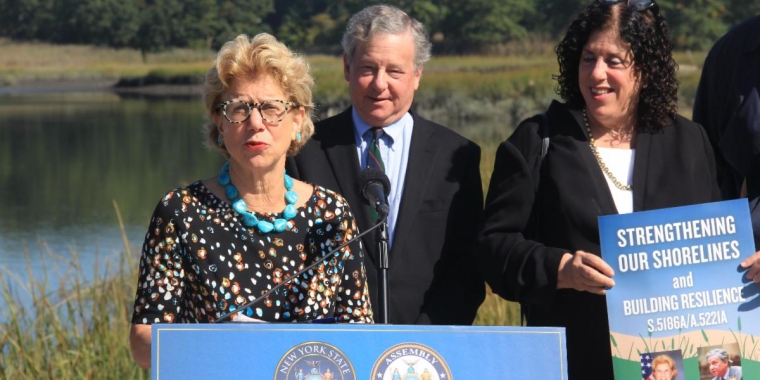
Senator Mayer and Assemblyman Otis Announce Legislation To Protect Shorelines and the Environment from Increased Climate Change Related Hazards Signed Into Law
Senator Shelley B. Mayer
October 3, 2023

Mamaroneck, NY – Senator Shelley Mayer (SD-37) and Assemblyman Steve Otis (AD-91) held a press conference today to announce the “Living Shorelines” legislation they sponsored (S.5186A/A.5221A) has been signed into law by Governor Kathy Hochul. This legislation will require the Department of Environmental Conservation (DEC) to encourage the use of nature-based solutions as the preferred approach for stabilizing tidal shorelines in the oversight and regulatory decisions of the agency.
Communities across New York State face intensifying climate change related hazards, including dangerous floods. Hurricane Ida devastated communities and homes across New York, particularly those along the Sound Shore communities. Seventeen New Yorkers lost their lives, and the storm caused $7.5 billion in damages, including damages to 11,000 homes and many roads. While less devastating, last week's storm underscored our vulnerability. As storms become more frequent, intense, and dangerous due to climate change, our communities become more vulnerable to these threats. Nature-based solutions, or living shorelines, are shoreline management techniques that are supported or inspired by nature or natural processes and functions and are designed to mimic natural shorelines, improving the resilience of our shorelines and communities.
Living shorelines have a wide range of benefits, including: the reduction of flooding and erosion, improved water quality, providing greater stability against threats of storms, attracting wildlife, and many more. The bill was inspired by the work of Save the Sound, Riverkeeper, and The Nature Conservancy, three major advocacy organizations confronting the impacts of climate change on water bodies and inland areas. County Legislator Catherine Parker, Mamaroneck Town Supervisor Jaine Elkind Eney, Village of Mamaroneck Deputy Mayor Lou Young, and Village of Larchmont Mayor Sarah Bauer were also present.
Senator Shelley B. Mayer said, “After Hurricane Ida, many constituents reached out to me for assistance with flood damage. I was happy my office could help individuals but the systemic impact of climate change requires much more. As the community rebuilds once again following the devastating storm this past week, we need to be proactive about increasing resilience and protecting against future flooding. This legislation will empower DEC to encourage the use of nature-based solutions, strengthening our shorelines and communities. I thank Save the Sound, Riverkeeper, the Nature Conservancy, and Assemblymember Otis for their partnership on this legislation.”
Assemblyman Steve Otis said, “Living shoreline principles are vital to improving coastal resilience, reducing flood impacts, preventing shoreline erosion, and protecting natural habitats. Thanks go to Governor Kathy Hochul, the NYS Department of Environmental Conservation, Assembly Environmental Conservation Committee Chair Deborah Glick, and the many environmental groups who support these important policies. Senator Mayer and I worked closely to move this bill in both houses. This is important legislation for coastal communities that will help advance nature-based policies at a time when sound practices are needed.”
Senator Pete Harckham, Chair of the Senate Committee on Environmental Conservation, said, “We have long known that many shorelines in New York are suitable for nature-based stabilization techniques, which protect both infrastructure and ecosystems from erosion. I thank Senator Mayer and Assemblymember Otis for sponsoring the legislation to make installation of living shorelines the preferred policy statewide and am grateful to Governor Hochul for signing it into law. This will help combat flooding and filter storm water runoff while enhancing the habitat for flora and fauna.”
Assemblymember Deborah Glick, Chair of the Assembly Committee on Environmental Conservation, said, “I want to thank Assemblyman Steve Otis and Senator Shelley Mayer for their thoughtful approach to shoreline protection. Utilizing nature based strategies to stabilize and support shorelines wherever possible is not only common sense but ensures long term viability of these vital ecosystems. I applaud Governor Hochul for signing this important legislation. Too often we have used a heavy hand to restore these fragile areas when they are best served by allowing nature to lead the way.”
County Executive George Latimer said, “I'm glad to see this legislation, which prioritizes nature-based solutions for stabilizing tidal shorelines in Westchester County, making significant progress. It reflects our commitment to environmental sustainability and resilience, ensuring a safer and more resilient coastline for our community. I thank our partners in State Government for their leadership, namely Senator Shelley Mayer and Assemblyman Steve Otis, and active community stakeholders for their efforts on this vital issue. Together, we continue to work towards a greener and more resilient future for Westchester County.”
David Ansel, Vice President of Water Protection at Save the Sound said, “New York City saw its rainiest day on record last Friday, with 8.65 inches falling at John F. Kennedy Airport. States of emergency were declared for the city, Long Island, and Westchester County. Extreme weather wrought by climate change is becoming more frequent and more severe. The Living Shorelines Act will prioritize nature-based solutions to strengthen our coastlines—solutions that are more resilient and will better protect people and property in the face of rising tides and temperatures. We are grateful to Governor Hochul for her signature and to Senator Shelley Mayer and Assemblymember Steve Otis for their vigilance in seeing this vital legislation through to fruition. Save the Sound has worked closely with these environmental champions and their legislative teams throughout the process, and we appreciate their commitment to creating more resilient coastlines and communities across the region.”
"Governor Hochul’s signature of the Living Shorelines Act marks a major step forward for climate resilience in New York State, ensuring prioritization of permits for nature-based features such as native plants and oyster beds that provide habitat for wildlife as well as flood protections for communities – over projects that harden shorelines such as concrete seawalls and berms,” said Jeremy Cherson, Riverkeeper’s Senior Manager of Government Affairs. “We look forward to engaging with DEC and other stakeholders on the development of new regulations and guidance to implement this important law. Riverkeeper thanks Senator Mayer and Assemblyman Otis as well as Governor Hochul, for recognizing the importance of our shorelines in promoting biodiversity and thriving communities.”
“Increasing living shorelines is an important step toward making our communities more resilient to sea level rise and storm events, and will help to alleviate impacts of flooding. That's why this legislation is necessary and timely and one of the priorities of the Long Island Sound Management Plan. Senator Shelley Mayer and Assemblyman Steve Otis know first-hand from their constituents how devastating recent storms have been. Directing NYS DEC to prioritize nature-based solutions for shorelines will help make all of New York State more resilient," said Nancy Seligson, Co-Chair of the Citizens Advisory Committee of the National Estuary Program for Long Island Sound, the Long Island Sound Study.
"The Nature Conservancy commends Assemblyman Otis for sponsoring legislation that recognizes the importance of working with nature to protect people, wildlife, and infrastructure in our changing climate. Natural shorelines like beaches, dunes, freshwater wetlands, and saltmarshes are a critical piece of improving quality of life and community safety in cities and towns throughout New York State. The Nature Conservancy applauds Assemblymember Otis and Senator Mayer for their dedication and leadership on this important issue," said Jessica Ottney Mahar, New York policy and strategy director for The Nature Conservancy.
Roger Downs, Conservation Director for the Sierra Club Atlantic Chapter said, “New York’s coastlines and inland waterways will be increasingly vulnerable to severe floods and storm surges as the impacts of climate change intensify. But attempts to harden our shores with expensive sea walls, or channelize our waterways will only exacerbate the problem of flooding and erosion, as hardscaping intensifies the destabilization of surrounding properties, beaches and embankments. Alternatively, wetlands, native plant communities, swales, oyster beds and other natural elements can impound millions of gallons of flood water, reduce storm surge and prevent erosion. We applaud Senator Mayer and Assemblymember Otis for establishing a blueprint for prioritizing nature-based solutions to sea-level rise and flooding, with the understanding that New York State will be most resilient to climate change if we protect and enhance the tapestry of ecosystems that protect us.”